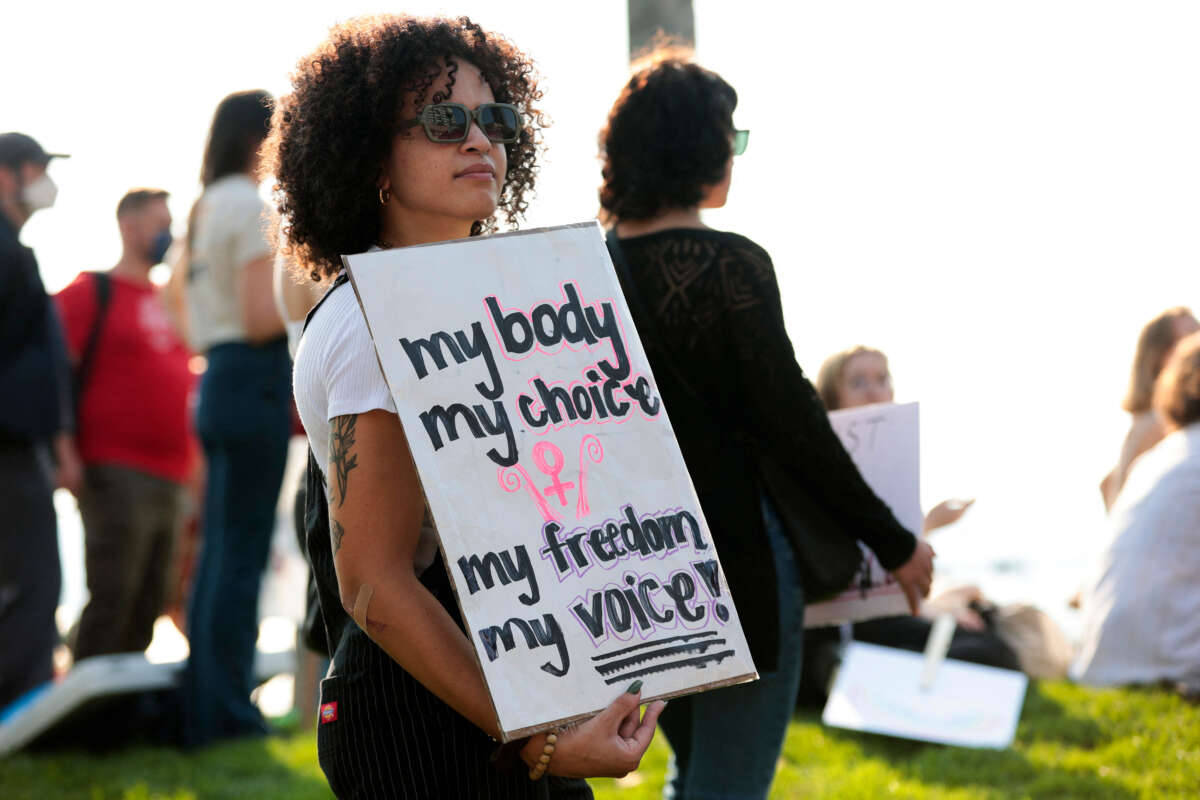Truthout is a vital news source and a living history of political struggle. If you think our work is valuable, support us with a donation of any size.
Democratic lawmakers in the Washington state legislature are pushing for the passage of a slew of bills that aim to protect abortion rights, both for state residents and for those traveling from jurisdictions where the procedure has been severely restricted.
The state of Washington is bordered by Oregon — where abortion rights remain intact — and Idaho, which has placed vast restrictions on abortion since the Supreme Court’s overturn of decades-old federal abortion protections last year.
Abortion is banned in Idaho except in cases where a pregnant person’s life is at risk, or in cases of rape or incest (though only if a police report has been filed). Because of Idaho’s proximity to Washington, it’s likely that residents will cross state lines to obtain the procedure — however, reproductive rights activists have raised concern that states with abortion bans may seek to penalize residents who travel out of state to get an abortion.
In response, lawmakers like Rep. Drew Hansen (D) have introduced bills to limit data that law enforcement agencies in other states can obtain from Washington.
A bill crafted by Hansen, which passed in the state House of Representatives last week, would protect the personal data of travelers to Washington state by blocking out-of-state subpoenas from jurisdictions seeking information on a person obtaining an abortion. The bill would also forbid law enforcement in Washington from cooperating with out-of-state investigations into people suspected of trying to get an abortion.
The bill would similarly protect the data of people who have traveled to Washington seeking gender-affirming care due to restrictions on such care in their state.
Lawmakers in the state legislature have proposed several additional abortion bills. One bill would ban health apps (including those that track menstruation cycles) from sharing the data of Washington residents or out-of-state travelers with law enforcement agencies unless they obtain the user’s consent to do so. Another bill would block discipline from other jurisdictions against Washington state doctors who perform an abortion for someone from a state where the procedure is illegal.
“If states like Texas are going to be creative and aggressive in restricting abortion, we in Washington state will be creative and aggressive in fighting back,” Hansen said in a statement on his data protection bill last week.
Should Hansen’s and other abortion rights bills make it to Gov. Jay Inslee’s (D) desk, it’s likely they will be signed into law. Inslee has repeatedly voiced his support for abortion rights and was among 20 governors in the U.S. last month to join a Reproductive Freedom Alliance. The initiative allows a network of governors and their staff across the country to share the best available strategies to combat anti-abortion measures and to expand abortion access —both for residents of their states and for people who live in states where the procedure is severely restricted.
In a press release on the alliance last month, Inslee said that abortion rights are “an issue of freedom.”
“Patients must have the freedom to make personal reproductive care decisions for themselves, without interference by activist politicians,” Inslee said. “Washington is taking strong action to protect these freedoms for every patient and provider in our state, and we are all in on the fight to protect a person’s right to an abortion across the country.”
A terrifying moment. We appeal for your support.
In the last weeks, we have witnessed an authoritarian assault on communities in Minnesota and across the nation.
The need for truthful, grassroots reporting is urgent at this cataclysmic historical moment. Yet, Trump-aligned billionaires and other allies have taken over many legacy media outlets — the culmination of a decades-long campaign to place control of the narrative into the hands of the political right.
We refuse to let Trump’s blatant propaganda machine go unchecked. Untethered to corporate ownership or advertisers, Truthout remains fearless in our reporting and our determination to use journalism as a tool for justice.
But we need your help just to fund our basic expenses. Over 80 percent of Truthout’s funding comes from small individual donations from our community of readers, and over a third of our total budget is supported by recurring monthly donors.
Truthout’s fundraiser ended last night, and we fell just short of our goal. But your support still matters immensely. Whether you can make a small monthly donation or a larger one-time gift, Truthout only works with your help.
